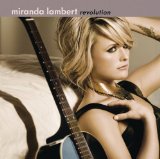when the talkin’ is over, it’s time to get a gun
posted at 7:37 pm by brandon in mine's on the 45If Sheryl Crow, James Taylor, Loretta Lynn, and Gene Simmons all tossed a bit of their DNA into a petri dish in an attempt to make a baby, you’ve gotta reckon the result wouldn’t end up markedly different from one Miranda Lambert, who has just made a blistering return to the spotlight with her third (and, by far, strongest) album, the spectacularly confident Revolution. Still brimming with that signature attitude that has set her remarkably apart from the pack ever since her brilliant debut four years ago, and yet refusing outright to fall headfirst into the redneck cliches that the music media seems so desperately to keep her boxed into, Lambert — who co-wrote eleven of the record’s fifteen tracks — makes damn sure she gets the laugh, and ends up with one of 2009’s most enjoyable album’s in the process.
By turns harrowing — “Dead Flowers,” still one of the year’s most affecting tracks — and heartbreaking — a devastating Tom Douglas/Allen Shamblin composition called “The House That Built Me,” which stands as the record’s emotional centerpiece — and hilarious — “Time to Get a Gun” (which is just as self-explanatory as its title makes it seem) and the brilliant “Me and Your Cigarettes” (as in, “we’re both bad habits, and you’re hopelessly addicted, honey child”) — Revolution jolts to and fro between a myriad tangled, twisted feelings, never allowing the listener to get too comfortable with what he or she is hearing. That’s a tricky tightrope to walk, especially in a time when so many country albums are required to be deliberately calculated, lest they knowingly forgo their commercial appeal, but Lambert ambles across it with the grace of a reborn Wollenda. One can easily pick out half a dozen potential radio singles — most strikingly, the aforementioned “Cigarettes” (which, for the life of me, I can’t figure out why it wasn’t the first song sent to radio!), as well as a smashingly raucous cover of John Prine’s “That’s the Way the World Goes ‘Round” (whose crunchy guitars and cocksure vocals honestly wouldn’t sound that far out of place played next to Smashing Pumpkins, Hole, and Garbage on any given classic alt-rock station) — which is probably the surest way of saying that country radio won’t touch any of ’em. Good thing, then, that Miss Miranda has proven definitively over the past four years that an artist can succeed, on her own terms, almost entirely without those stingy, scared bastards. Revolution stands proudly on that very same fault line, the tallest feather in Lambert’s already crowded cap.




